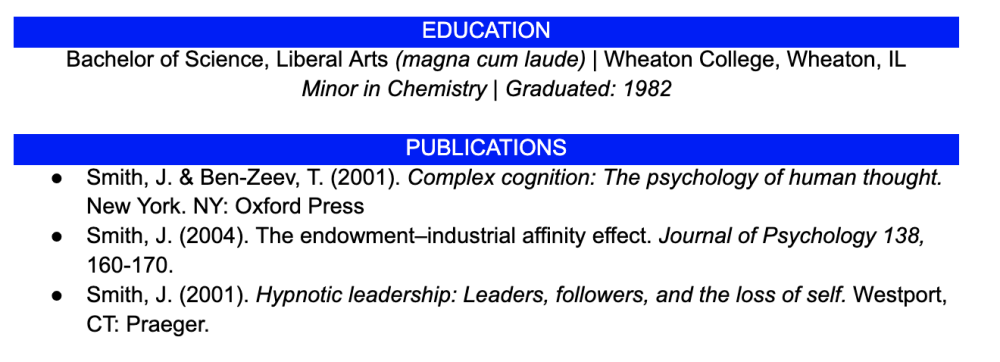How to List Publications on Your Resume: A Guide for Researchers (+Examples)

8 min read

Job seekers whose experience includes research and publications often wonder how to include that information in their resumes. After all, few resume templates are designed to highlight such accomplishments, and most people are reluctant to significantly alter those widely-accepted resume formats.
So, how can people in the scientific, literature, or academic fields properly showcase their research and publications on a resume or curriculum vitae (CV)? We have the tips you need to properly document those important achievements and citation examples you can use as a helpful guide.
Why publications matter on a resume
If you have experience doing academic/scientific research or writing publications, then you have skills that set you apart from most job seekers. Your research and publications identify you as someone with clear writing skills.
They also demonstrate analytical skills – which employers tend to value highly – and a capacity for being a thought leader. Those qualities are important qualifications for anyone seeking a job in academia or any science and engineering field.
For published authors and writers, having material go through to publishing can speak volumes about your experience and the quality of your work.
Publications on a resume example
Regardless of which option you choose, it is important to use the proper APA formatting for publications when including your publications on your resume. Be sure to use a consistent format when listing publications and describe your research, focus, and efforts as briefly as possible. Consider the following examples.
Published article or paper
[Your Name], [Title of article], [Title of publication], [Publication date], [Pages]
Authored Book
[Your last name, Your first name], [Title of your book], [Place of publication and publisher], [Year published]
Your options for including publications on a resume
Fortunately, you have several options when it comes to listing publications in your resume. The option you choose will probably depend upon the nature of your research and publications and the type of position you’re seeking.
There are three main options for including these details in your resume in an organized manner: creating a separate section, using a summary, or documenting them on a separate page.
Option # 1: Create a separate section for your research and publications
One way to highlight your publications is to create a separate section for them.
(We wrote a good post here on what sections a resume should include)
You should only consider this option if you have a limited number of citations to list or if your work has appeared in important industry journal publications.
By separating them in this way, you can help to focus attention on these accomplishments. At the same time, that separation helps to ensure that your other skills and achievements are not overshadowed in any way.

Option # 2: Using a summary for your publications
Another great way to showcase relevant publications in your resume is to include them in a short summary. This option is best used when the achievements are not crucial to landing a job. It's also a good option when there are only one or two citations to list.
Simply insert a bullet point or two at the end of your achievements section and include the appropriate details.
Option # 3: Create a separate page for your publications
If you have a substantial number of accomplishments that involve research and publications, you could consider a separate page for those details.
Simply create a list of these citations for a page titled “Publications” or “Research.” There, you can list all relevant citations in reverse chronological order. If you choose this option, be sure to mention in your cover letter that you've included the list.
What are research skills?
As we move on from talking about publications to discussing research, let’s first define research skills. Research skills are all those skills needed to investigate and analyze a subject and then communicate your findings to others. In short, there is no simple easily-defined skill that encompasses all these talents. Instead, your ability to research involves the effective use of a range of other skills, including
Data interpretation
Information synthesis
Research skills are highly prized across a wide spectrum of industries. The fact is that researchers are invaluable for many employers and hiring managers. After all, new ideas often come only after an exhaustive analysis of existing practices. Is it any surprise, then, that many of the most innovative companies in the world look for employees who possess these skills?
The good news is that most of us possess at least some skill in researching. Unfortunately, too many of us don’t recognize those skills or why they matter to employers. Most of these skills relate to critical thinking in some way. They involve accumulating information and using it to draw reasoned conclusions. Naturally, those conclusions need to be conveyed to others with effective communication skills.
Research skills are among the most highly-prized transferable skills employers are looking for in today's competitive job market.
Employers value these skills because they are essential to progress. Innovation only comes from research and inspired insight. As a result, companies that rely on innovation to remain competitive tend to rely on employees who are talented researchers. Obviously, there are entire fields of industry that use researchers only for that purpose. In a more general sense, however, research skills are widely used by many different types of employees. And they use them in almost every industry in the marketplace.
How to list research on a resume
Including information about your research skills on a resume can be challenging because people perform research in a number of different capacities. Regardless of if you were the lead researcher or part of a team, it’s encouraged to include your research projects on your resume. You can detail how your efforts helped them move the project forward and what contributions you made.
Even if your findings weren't published, or are in the process of being published, you should include your work in research on your resume still. This is because the skills acquired during research are, again, highly prized by employers. It’s less about the result and more about what kind of professional qualifications your research efforts are able to embody.
Including research on your resume:
To describe your experience performing research on a subject, summarize your accomplishments in a brief section. You should include a description of your role in the research, the topic that you were exploring, and some information about your findings.
Example of research listed on a resume:
Economics Research Project, Dynamic University
Dec 2017 – Apr 2020
Key participant in research project examining blockchain technology’s potential impact on financial intermediation. Explored use case studies for cross-border payment systems, intrabank transactions, and microtransactions for e-commerce.
Designed model simulation to study blockchain-based payment system
Worked in tandem with Alpha and Delta Finance to create simulated intrabank transfers using digitalized tokens
Studied e-commerce script integration for cryptocurrency payments
Member of a 3-person team tasked with presenting findings to 2018 National Banking Technology Conference
You can also combine your research with other sections:
Research and Publications
Research and Professional Development
Educations and Research
Why the cover letter may be a superior choice
There are some very good reasoning for using a cover letter as a vehicle for talking about research and publication citations. That option can help you avoid confusion within your resume and keep the resume length under control. It can also help to ensure that your cover letter is more than just a rehash of your resume. Most importantly, using the cover letter in this way can help to establish your expertise right away.
If you have a lot of experience in research, it can help you save space on your resume too. Your resume can have lists of your participating research and publications, but that list doesn’t always represent your efforts well. In your cover letter, you can expand upon the specific professional skills that you developed from your experience.
Even though the cover letter is formatted differently than a resume, when including research and publications in a resume or cover letter, make sure you use proper citations and give credit where due.
Research and publications can land coveted interviews
While it is tempting to include every noteworthy achievement in your life, it is important to maintain focus and perspective. Only cite publications that enhance your qualifications or demonstrate skills relevant to the position. Anything relevant to your industry or skill set obviously falls into this category. Casual articles published in a hobbyist magazine probably don’t need to be shared.
However, your research and publications can help employers to identify you as a recognized expert in your field. That can only help to enhance your chances of landing a great job. So, choose your resume options carefully and make sure that you use proper citation formats to convey this important information to every prospective employer.
ZipJob’s team of professional resume writers knows how to properly showcase your publications on a resume to get past an ATS and impress a hiring manager.
Recommended reading:

Written by
Emma Elizabeth, Resume Writer, Emma Elizabeth, Resume Writer
Emma is a certified employment specialist with over 6 years of experience in career mentorship and employment training. With an affinity for technical writing, Emma is passionate about developing training, policy, and procedure manuals. In 2020 she helped design Colorado’s first state-certified training program for people with disabilities entering the workforce.
